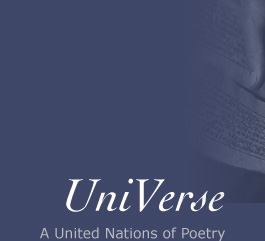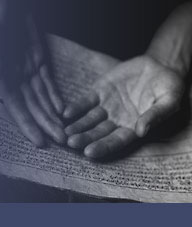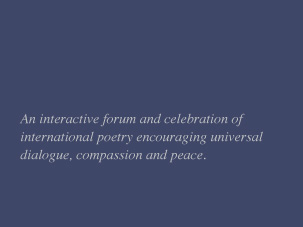| |
 |
 |
 |
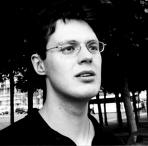 Ilya Kaminksky was born in Odessa, former Soviet Union in 1977, and arrived to the United States in 1993, when his family was granted asylum by the American government. Ilya is the author of Dancing In Odessa (Tupelo Press, 2004) which won the Whiting Writer's Award, the American Academy of Arts and Letters' Metcalf Award, the Dorset Prize, and the Ruth Lilly Fellowship given annually by Poetry magazine. Dancing In Odessa was also named Best Poetry Book of the Year 2004 by ForeWord Magazine. Ilya Kaminksky was born in Odessa, former Soviet Union in 1977, and arrived to the United States in 1993, when his family was granted asylum by the American government. Ilya is the author of Dancing In Odessa (Tupelo Press, 2004) which won the Whiting Writer's Award, the American Academy of Arts and Letters' Metcalf Award, the Dorset Prize, and the Ruth Lilly Fellowship given annually by Poetry magazine. Dancing In Odessa was also named Best Poetry Book of the Year 2004 by ForeWord Magazine.
In addition, Ilya writes poetry in Russian. His work in that language was chosen for "Bunker Poetico" at Venice Bienial Festival in Italy. In late 1990s, he co-founded Poets For Peace, an organization which sponsors poetry readings in the United States and abroad with a goal of supporting such relief organizations as Doctors Without Borders and Survivors International.
Ilya has served as a Writer In Residence at Phillips Exeter Academy and has taught poetry at numerous literary centers. Ilya has also worked as a Law Clerk at the National Immigration Law Center, and more recently at Bay Area Legal Aid, helping impoverished and homeless people in solving their legal difficulties.
He teaches Contemporary World Poetry, Creative Writing, and Literary Translation in the Master of Fine Arts Program in Creative Writing at San Diego State University. This year, he is also the 2007-2008 Writer-in-Residence at Greenhills School in Ann Arbor, Michigan. He lives in San Diego, Califonia with his beautiful wife, Katie Farris.
Biography reprinted with permission from www.ilyakaminsky.com
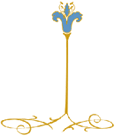 Read more about Ilya Kaminsky at Blue Flower Arts. Read more about Ilya Kaminsky at Blue Flower Arts.
|
|
|
English version
Author's Prayer
If I speak for the dead, I must
leave this animal of my body,
I must write the same poem over and over
for the empty page is a white flag of their surrender.
If I speak of them, I must walk
on the edge of myself, I must live as a blind man
who runs through the rooms without
touching the furniture.
Yes, I live. I can cross the streets asking "What year
is it?"
I can dance in my sleep and laugh
in front of the mirror.
Even sleep is a prayer, Lord,
I will praise your madness, and
in a language not mine, speak
of music that wakes us, music
in which we move. For whatever I say
is a kind of petition and the darkest days
must I praise.
Reprinted with permission of the author. "Author's Prayer" previously appeared in Mars Hill Review.
|
|
|
English version
Marina Tsvetaeva
In each line's strange syllable: she awakes
as a gull, torn
between heaven and earth.
I accept her, stand with her face to face.
-- in this dream: she wears her dress
like a sail, runs behind me, stopping
when I stop. She laughs
as a child speaking to herself:
"soul = pain + everything else."
I bend clumsily at the knees
and I quarrel no more,
all I want is a human window
in a house whose roof is my life.
Reprinted with permission from the author. "Marina Tsvetaeva" has also appeared in Poetry Magazine.
|
|
|
English version
Praise
. . .but one day through the gate left half-open
there are yellow lemons shining at us
and in our empty breasts
these golden horns of sunlight
pour their songs.
-- Montale
Time, my twin, take me by hand
through the streets of your city;
my days, your pigeons, are fighting for crumbs -
*
A woman asks at night for a story with a happy ending.
I have none. A refugee,
I go home and become a ghost
searching the houses I lived in. They say -
the father of my father of his father of his father
was a prince
who married a Jewish girl
against the Church's will and his father's will and
the father of his father. Losing all,
eager to lose: the estate, ships,
hiding this ring (his wedding ring), a ring
my father handed to my brother, then took. Handed,
then took, hastily. In a family album
we sit like the mannequins of school-children
whose destruction,
like a lecture, is postponed.
Then my mother begins to dance, re-arranging
this dream. Her love
is difficult; loving her is simple as putting
raspberries
in my mouth.
On my brother's head: not a single
gray hair, he is singing to his twelve-month-old son.
And my father is singing
to his six-year-old silence.
This is how we live on earth, a flock of sparrows.
The darkness, a magician, finds quarters
behind our ears. We don't know what life is,
who makes it, the reality is thick
with longing. We put it up to our lips
and drink.
*
I believe in childhood, a native land of math exams
that return and do not return, I see -
the shore, the trees, a boy
running across the streets like a lost god;
the light falls, touching his shoulder.
Where memory, an old flautist,
plays in the rain and his dog sleeps, its tongue
half hanging out;
for twenty years between life and death
I have run through silence: in 1993 I came to America.
*
America! I put the word on a page, it is my keyhole.
I watch the streets, the shops, the bicyclist, the
oleanders,
two women strolling along the water front.
I open the windows of an apartment
and say: I had masters once, they roared above me,
Who are we? Why are we here?
the tales they told began with:
"mortality," "mercy."
A lantern they carried still glitters in my sleep,
confused ghosts who taught me living simply.
-- in this dream: my father breathes
as if lighting a lamp over and over. The memory
is starting its old engine, it begins to move
and I think the trees are moving.
I unmake these lines, dissolving in each vowel,
as Neruda said, my country
I change my blood in your direction. The evening
whispers
with its childlike, pulpy lips.
On the page's soiled corners
my teacher walks, composing a voice;
he rubs each word in his palms:
"hands learn from the soil and broken glass,
you cannot think a poem," he says,
"watch the light hardening into words."
*
I was born in the city named after Odysseus
and I praise no nation
but the provinces of human longing:
to the rhythm of snow
an immigrant's clumsy phrase
falls into speech.
But you asked
for a story with a happy ending. Your loneliness
played its lyre. I sat
on the floor, watching your lips.
Love, a one legged bird
I bought for forty cents as a child, and released;
is coming back, my soul in reckless feathers.
O the language of birds
with no word for complaint! -
the balconies, the wind.
This is how, while darkness
drew my profile with its little finger,
I have learned to see past as Montale saw it,
the obscure thoughts of God descending
among a child's drum beats,
over you, over me, over the lemon trees
Reprinted with permission from the author. "Praise" previously appeared in Salmagundi.
|
|
|
English version
Music Humana
[an elegy for Osip Mandelstam]
(Hear Ilya Kaminsky reading Musica Humana live at Bowdoin College, February 2, 2006)
[A modern Orpheus: sent to hell, he never returned, while his widow
searched across one sixth of the earth’s surface, clutching the saucepan with
his songs rolled up inside, memorizing them by night in case they were
found by Furies with a search warrant.]
While there is still some light on the page,
he escapes in a stranger’s coat with his wife.
And the cloth smells of sweat;
a dog runs after them
licking the earth where they walked and sat.
In the kitchen, on a stairwell, above the toilet,
he will show her the way to silence,
they will leave the radio talking to itself.
Making love, they turn off the lights
but the neighbor has binoculars
and he watches, dust settling on his lids.
It is the 1930s: Petersburg is a frozen ship.
The cathedrals, cafés, down Nevski Prospect
they move, as the New State
sticks its pins into them.
[In Crimea, he gathered together rich ‘liberals’ and said to them strictly: On
Judgment Day, if you are asked whether you understood the poet Osip
Mandelstam; say no. Have you fed him? – You must answer yes.]
I am reading aloud the book of my life on earth
and confess, I loved grapefruit.
In a kitchen: sausages; tasting vodka,
the men raise their cups.
A boy in a white shirt, I dip my finger
into sweetness. Mother washes
behind my ears. And we speak of everything
that does not come true,
which is to say: it was August.
August! the light in the trees, full of fury. August
filling hands with language that tastes like smoke.
Now, memory, pour some beer,
salt the rim of the glass; you
who are writing me, have what you want:
a golden coin, my tongue to put it under.
(The younger brother of a cloud,
he walks unshaven in dark-green pants.
In cathedrals: he falls on his knees, praying HAPPINESS!
His words on the floor are the skeletons of dead birds.)
I’ve loved, yes. Washed my hands. Spoke
of loyalty to the earth. Now death,
a loverboy, counts my fingers.
I escape and am caught, escape again
and am caught, escape
and am caught: in this song,
the singer is a clay figure,
poetry is the self—I resist
the self. Elsewhere:
St. Petersburg stands
like a lost youth
whose churches, ships, and guillotines
accelerate our lives.
[In summer 1924 Osip Mandelstam brought his young wife to St.
Petersburg. Nadezhda was what the French call laide mais charmante.
An eccentric? Of course he was. He threw a student down the staircase
for complaining he wasn’t published, Osip shouting: Was Sappho? Was Jesus Christ?]
Poet is a voice, I say, like Icarus,
whispering to himself as he falls.
Yes, my life as a broken branch in the wind
hits the Northern ground.
I am writing now a history of snow,
the lamplight bathing the ships
that sail across the page.
But on certain afternoons
the Republic of Psalms opens up
and I grow frightened that I haven’t lived, died, not enough
to scratch this ecstasy into vowels, hear
splashes of clear, biblical speech.
I read Plato, Augustine, the loneliness of their syllables
while Icarus keeps falling.
And I read Akhmatova, her rich weight binds me to the earth,
the nut trees on a terrace breathing
the dry air, the daylight.
Yes, I lived. The State hung me up by the feet, I saw
St. Petersburg’s daughters, swans,
I learned the grammar of gulls’ array
and found myself for good
down Pushkin Street, while memory
sat in the corner, erasing me with a sponge.
I’ve made mistakes, yes: in bed
I compared government
to my girlfriend.
Government! An arrogant barber’s hand
shaving off the skin.
All of us dancing happily around him.
[He sat on the edge of his chair and dreamt aloud of good dinners. He
composed his poems not at his desk but in the streets of St. Petersburg;
he adored the image of the rooster tearing apart the night under the
walls of Acropolis with his song. Locked up in the cell, he was
banging on the door: “You have got to let me out, I wasn’t made for prison.”]
Once or twice in his life, a man
is peeled like apples.
What’s left is a voice
that splits his being
down to the center.
We see: obscenity, fright, mud
but there is joy of shape, there is
always
more than one silence.
-- between here and Nevski Prospect,
the years, birdlike, stretch, --
Pray for this man
who lived on bread and tomatoes
while dogs recited his poetry
in each street.
Yes, count “march,” “july”
weave them together with a thread –
it’s time, Lord,
press these words against your silence.
*
-- the story is told of a man who escapes
and is captured
into the prose of evenings:
after making love, he sits up
on a kitchen floor, eyes wide open,
speaks of the Lord’s emptiness
in whose image we are made.
–he is out of work– among silverware
and dirt he is kissing
his wife’s neck so the skin of her belly tightens.
One would think of a boy laying
syllables with his tongue
onto a woman’s skin: those are lines
sewn entirely of silence.
[Nadezhda looks up from the page and speaks: Osip, Akhmatova and I
were standing together when suddenly Mandelstam melted with joy:
several little girls ran past us, imagining themselves to be horses.
The first one stopped, impatiently asking: “Where is the last horsy?”
I grabbed Mandelstam by his hand to prevent him from joining; and
Akhmatova, too, sensing danger, whispered: “Do not run away from us,
you are our last horsy.”]
-- as I die, I walk barefoot across my country,
here winter builds the strongest
solitude, tractors break into centaurs
and gallop through plain speech:
I am twenty-three, we live in a cocoon,
the butterflies are mating.
Osip puts his fingers into fire; he
gets up early, walking around
in his sandals. Writes slowly. Prayers
fall into the room. Moths
are watching him from the window. As his tongue
passes over my skin, I see
his face from underneath,
its aching clarity
– thus Nadezhda speaks,
standing in an orange light,
her hands are quiet, talking
to themselves:
O God of Abraham, of Isaak and of Jacob
on your scale of Good and Evil,
put a plate of warm food.
*
When my husband returned
from Voronezh, in his mouth
he hid a silver spoon –
in his dreams,
down Nevski Prospect, the dictator ran
like a wolf after his past,
a wolf with sleep in its eyes.
He believed in the human being. Could not
cure himself
of Petersburg. He recited by heart
phone numbers
of the dead.
O what he told in a low voice! --
the unspoken words became traces of islands.
When he slapped
Tolstoy in the face, it was good.
When they took my husband, each word
disappeared in a book.
They watched him
as he spoke: the vowels had teeth-marks.
And they said: You must leave him alone
for already behind his back
the stones circle all by themselves and fall.
[Osip had thick eyelashes, to the middle of his cheeks. We were walking along
Prehistenka St., what we were talking about I don’t remember. We turned
onto Gogol Boulevard, and Osip said, “I am ready for death.” At his arrest
they were searching for poems, all over the floor. We sat in one room. On the
other side of the wall, at a neighbor’s, a Hawaiian guitar was playing. In my
presence the investigator found “The Wolf” and showed it to Osip. He
nodded slightly. Taking his leave, he kissed me. He was led away at 7A.M.]
At the end of each vision, Mandelstam
stands with a clod of earth, throwing
bits at the passers-by. You will recognize him, Lord:
– he hated Tsarskoe Selo,
told Mayakovski: “stop reading your verse, you are not
a Rumanian orchestra.”
What harmony was? It raveled
and unraveled; Nadezhda said the snow fell inside her,
she heard the voice of young chickens all over her flesh.
Nadezhda, her Yes and No are difficult
to tell apart. She dances, a skirt tucked between her thighs
and the light is strengthening.
In each room’s
four corners: he is making love to her earlobes, brows,
weaving days into knots.
He is traveling across her kitchen, touching furniture,
a small propeller in his head
turning as he speaks. Outside,
a boy pissing against the tree, a beggar
cursing at his cat –that summer 1938–
the walls were hot, the sun beat
against the city’s slabs
‘the city that loved to say yes to the powerful.’
At the end of each vision, he rubbed her feet with milk.
She opened her body, lay on his stomach.
We will meet in Petersburg, he said,
we have buried the sun there.
Reprinted with permission of the author. "Musica Humana" was published in Dancing In Odessa (Tupelo Press, 2004).
Audio file, Copyright © 2006, From the Fishouse.
For more poems by Ilya Kaminsky, please visit www.ilyakaminsky.com.
|
 |
 |
|
 |
|
